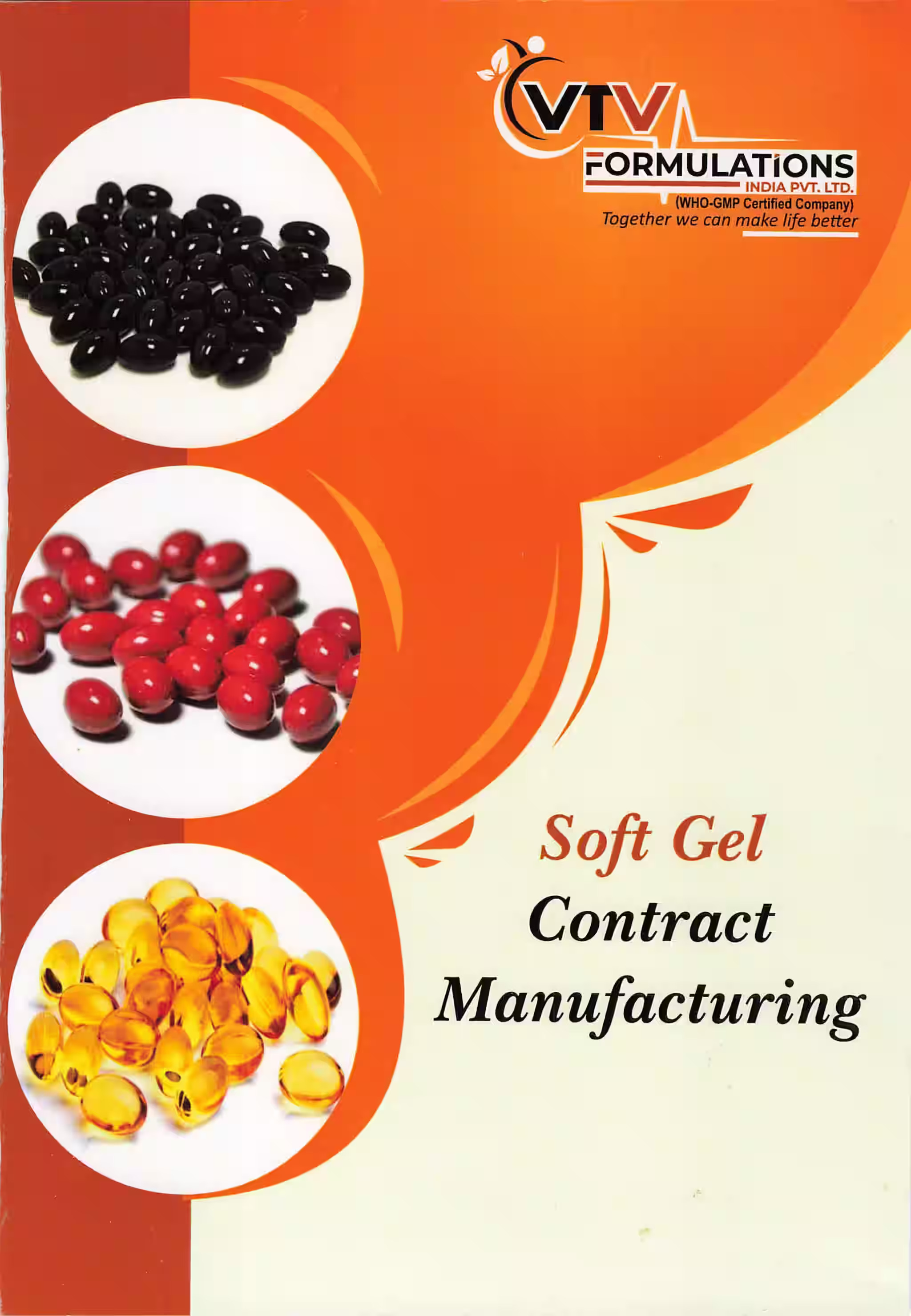Choosing the Best Capsules Third-Party Manufacturer in India: A Deep Dive into VTV Formulations

If you think of the word capsules, what will come to your mind? Well, probably some small, round or oval-shaped medicines that are easy to swallow. Even if you have a basic knowledge of what capsules are and what they are used for, that's as much as most people know about them.Capsules have been around since the 19th century and its usage has grown significantly over time. Manufacturers use capsule manufacturing services when they want to package their products in a small and easy-to-consume packaging. These benefits remain largely the same for all types of businesses who produce these products - pharmaceutical companies, food manufacturers and nutritionists.Vendors who sell capsule manufacturing services do so under different names like contract manufacturers. They provide everything from raw materials to final assembly of packaged goods at an affordable price. If you're looking for one such vendor from which you can get custom services as well, read on below for further details.
What Do Capsule Third Party Manufacturers Do?
Third party manufacturers have a lot of different responsibilities when they work with a company. These tasks can include printing the labels on a product, assembling the final product, and packaging it. Some third party manufacturers also offer other services like design and development of new products or packaging materials, as well as logistics and transportation services. Third party manufacturers are usually chosen for their proximity to the company's main location, so that production costs are reduced. There is also an emphasis on finding a third party manufacturer who can provide high-quality products at a competitive price. The best way to find the right capsule third party manufacturers in India for your business is by talking to companies who use these services and asking about their experiences with those businesses. You should ask about turnaround times, quality standards, and what materials the third party manufacturer offers for use with your goods.
Why Use a Third Party Manufacturer?
There are six reasons a business might want to work with a third party manufacturer. - One of the most common reasons is because they don't have any in-house production capabilities. If a company doesn't have the resources to create their own goods, they might look for a third party manufacturer to provide them with raw materials and services. - When outsourcing to a third party manufacturer, you have the option to choose which products you would be interested in manufacturing. This can be beneficial for companies that are looking for specific product lines; for example, if your company only manufactures one type of product and it sells well, you can outsource the rest of your production needs to another factory. - Third party manufacturers can provide lower prices on goods than if you were to manufacture them yourself. It is possible that by outsourcing some or all of your manufacturing needs, your costs will go down and help make your business more profitable. - Third party manufacturers can also be helpful when it comes to obtaining raw materials at low cost because these companies often buy in bulk. - There is also the possibility that a third party manufacturer will allow you more freedom in designing the final product without having strict specifications like some other suppliers might. A third party manufacturer should be willing to work with their clients on creative projects and offer their ideas as well as expertise during development stages so that everyone's end goal is reached: creating an excellent final product. -

1. Overview: Why India for Capsules Contract Manufacturing
India has emerged as a global hub for pharmaceutical manufacturing due to:
Cost efficiency — relatively lower labor and infrastructure costs.
Skilled workforce — many pharma engineers, chemists, quality assurance and regulatory professionals.
Established regulatory frameworks — WHO-GMP, ISO, national agencies (like CDSCO) govern operations.
Scalable capacity — from small batches to large volumes.
Capsule manufacturing (both hard gelatin, HPMC, or vegetarian capsules; sometimes soft gels) requires strict compliance to quality, good supply of raw materials (capsule shells, excipients), and precise control over process variables (fill weight, moisture, sealing, etc.).
2. Key Criteria to Evaluate When Choosing a Capsule Manufacturer
When selecting a third party manufacturer (TPM) for capsules, these are the critical parameters:
| Parameter | What to Look for / Why It Matters |
| Certifications & Regulatory Approvals |
WHO-GMP, ISO 9001, possibly approvals for export markets. These ensure the facility, processes, personnel, QC meet global standards. |
| Facility & Infrastructure |
Cleanrooms, climate control (humidity/temperature), capsule filling machines, suitable packaging lines; ability to manage cross-contamination. |
| Range of Formulations |
Not just hard capsules but the ability to handle vegetarian capsules (HPMC), softgels, where applicable. Also ability to handle different capsule sizes, filling materials (powders, granules, pellets, or liquids if softgel). |
| Quality Assurance Systems |
Raw material testing; in-process control; finished goods QC; microbial limits; stability studies; certificate of analysis; recall readiness. |
| Scalability & Capacity |
Can the manufacturer scale from pilot batches to commercial sizes without compromising quality or timelines? |
| R&D and Formulation Support |
If you have a new capsule formulation (e.g. modified release, herbal, nutraceutical), does the TPM support development, stability trials, regulatory documentation? |
| Supply Chain & Raw Material Sourcing |
Good manufacturers have strong, validated sources of capsule shells, excipients etc., to ensure consistency. |
| Packaging & Labelling Flexibility |
Options for blister, bottle, sachets; labelling support; custom packaging; compliance with regional regulations. |
| Cost & Lead Time |
Competitive costing, transparent quoting; realistic lead times; ability to meet deadlines. |
| Reputation & Track Record |
Prior experience, client testimonials, regulatory inspections record. |
3. VTV Formulations: What Makes Them Stand Out
Using the information publicly available, VTV Formulations (Pvt. Ltd.) emerges as a strong candidate in the capsule third-party manufacturer space. Below are their strengths, caveats, and what to check further:
Strengths :
- WHO-GMP Certified Facility : VTV is WHO-GMP certified, meaning their processes meet globally recognized standards.
- Comprehensive Product Portfolio : They produce not just capsules, but tablets, injectables (liquid & dry powder), nasal sprays, eye & ear drops, ointments, etc. If you are a brand with multiple dosage forms, one partner like this reduces complexity.
- Modern Infrastructure & Automation : They mention "state-of-the-art infrastructure" and use of modern automation systems. This helps in maintaining consistency and reducing errors.
- Regulatory & Documentation Support : They offer end-to-end services — formulation, branding, packaging, regulatory compliance. For a brand, this is valuable as reduces the burden.
- Operational Flexibility & Scale : The ability to produce across wide therapeutic segments and dosage forms suggests good capacity and expertise.
- Geographic Location : Based in Baddi, Himachal Pradesh, which is a pharma hub (many tax/industrial benefits, cluster advantages, access to raw materials, talent) in India.
Areas to Investigate
While VTV has many strong features, any potential partner should double check:
- The specific capsule formats they handle — Do they do hard gelatin only? HPMC/vegetarian capsules? Softgels? If softgels are needed, does VTV have that capability or only third parties do that? (Their website mentions softgel manufacture services in some contexts, but verification required.)
- Minimum Order Quantities (MOQs) — for capsules vs other forms. Often capsules have different scale-economics.
- Their stability data and shelf — life evidence for capsule formulations (particularly if moisture/temperature impact is large).
- Raw material sourcing for capsule shells — whether they maintain consistent certified sources, and control over shell quality (e.g. moisture, translucency, impurities).
- Regulatory history — any recalls, warning letters, inspection reports, compliance issues.
- Delivery & lead times — especially for branded products, speed matters.
- Packaging compliance for target regions — if exporting abroad, need adherence to foreign labeling, import permits, etc.
4. Case Study / Sample of VTV: Capsule Manufacturing Service Flow
Here’s a sample workflow one could expect when engaging a TPM like VTV for capsule manufacturing:
- Initial Consultation & Requirement Definition : Dosage form (capsule), required size, fill material (powder, granules, etc.), desired release profile, target market(s), etc.
- Feasibility & Formulation Development : If existing API/excipient formulation; or new development. Trial batches, lab scale.
- Quality & Regulatory Planning : Stability studies, batch documentation, safety/toxicity (if applicable), dossier preparation.
- Pilot Batch / Sample Production : Small run to confirm quality, performance, packaging etc.
- Full-Scale Production : Manufacturing under GMP with QC at raw, in-process, and finished product levels.
- Packaging & Labelling : According to market requirements. VTV reportedly offers branding & packaging support.
- Testing & Release : Certificate of Analysis (COA), stability, microbial, uniformity, moisture, etc.
- Distribution & Logistics Support : VTV may help or otherwise facilitate delivery, especially for domestic supply chains. For export, ensuring compliance (export documentation).
- After-Sale Support & Refill / Reorders : Ensuring consistency in subsequent batches, handling regulatory renewals, etc.
5. Checklist: Questions to Ask Prospective Manufacturer (Capsule-Specific)
Before finalizing with any TPM, including VTV, here are capsule-specific questions:
-
Do you produce hard gelatin capsules, vegetarian (HPMC) capsules, softgel capsules? What is the shelf life and stability of each type in your facility?
-
What is the moisture content specification for shell & fill? How do you control moisture during manufacturing & packaging?
-
What capsule sizes do you handle (size 0, 1, 2, etc.) and fill weights?
-
Is there a capsule sealing facility (if needed)?
-
Do you conduct accelerated and long-term stability tests for capsules in the climate conditions relevant to my target market?
-
What are your costs per unit (capsule) at differing volumes? What are the MOQs?
-
What packaging formats do you support (bottles, blister packs, strips, etc.) for capsules?
-
Can you provide COA, Batch records, and audit access if needed?
-
What is your lead time from approval of formula to batch delivery?
-
What are your logistical capabilities (domestic shipping, export, cold chain etc., if required)?
6. Summary: Is VTV Formulations a Good Choice?
Based on available data, yes, VTV Formulations appears to be a strong choice for capsule third-party manufacturing in India, especially if you want:
-
WHO-GMP compliance
-
Multi-dosage form capabilities
-
Support in R&D/formulation/packaging
-
Scalable production
However, the match depends on your specific needs (capsule type, target markets, volumes, price point).
How VTV Compares vs Other Capsule Manufacturers in India
Here are a few alternatives / comparables (some of which may not be as fully integrated, or specialize in caps only), with points of comparison:
| Manufacturer | Strengths | Weaknesses / Unknowns (vs VTV) |
| Strides Pharma Science |
Very large scale; global presence; experience with softgels & hard capsules; export experience. |
Possibly higher cost; may have higher MOQs; less flexibility for smaller clients. |
| Emcure Pharmaceuticals |
Broad product range, strong R&D, good reputation. |
Their facilities may be busy; may have longer lead times. |
| Wellmed Pharma |
Specializes in capsule third party manufacturing; good for clients focused only on capsule-based products. |
Might not offer all dosage forms; may lack scale that VTV offers in other dosage forms. |
| Lifevision Healthcare |
Good reputation for capsules; may offer competitive pricing for smaller batches. |
Need to check certifications, readiness for large orders, regulatory support for exports. |
In many cases, VTV appears to offer a more integrated, full-service solution: multiple dosage forms + regulatory + packaging + branding support + WHO-GMP facility. For brands wanting one partner to handle multiple forms, that reduces risk and logistic complexity.
Explore Related Blogs
Stay informed with our curated selection of similar blogs, offering expert perspectives on pharmaceutical trends, regulatory updates, and product innovations.
These articles are designed to help healthcare professionals, partners, and businesses stay ahead in an ever-evolving industry. Explore more to deepen your knowledge and make informed decisions.